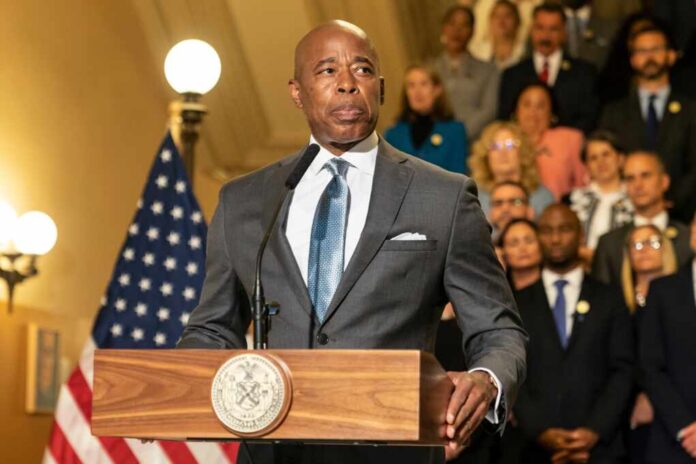
Mayor Eric Adams has stunned New Yorkers by announcing that veterans and city workers will now receive double the affordable housing preference in city lotteries—a move that signals a dramatic shift in priorities after years of leftist governance and policies that left many essential workers and patriots behind.
Story Highlights
- Mayor Adams doubles affordable housing preference for city workers and adds veterans for the first time.
- The City’s Housing Connect Lottery now reserves 10% of units for municipal employees and veterans, up from 5%.
- Policy arrives amid escalating housing costs and mounting public frustration with government spending and priorities.
- Supporters cite public safety and respect for service; critics debate broader impacts on housing access.
Adams Surprises City with Major Housing Policy Shift
In an unexpected announcement on July 31, 2025, Mayor Eric Adams declared a new housing policy that will double the share of affordable apartments reserved for city workers and, for the first time, include military veterans in the preference system. Under this revised approach to the NYC Housing Connect Lottery program, 10% of units in new affordable housing developments will be set aside for these groups, compared to the previous 5%. Adams highlighted the need to support those who serve the city and the nation, stating, “We want to make sure the public servants who power our city can afford to live in our city… Too many military veterans still struggle with housing insecurity.” This announcement comes as New Yorkers grapple with a persistent housing shortage, record-high rents, and ongoing concerns about government priorities and fiscal discipline.
Eric Adams reserves more NYC affordable housing for veterans, city workers in surprise announcement https://t.co/XcOgYvNn1v pic.twitter.com/MSkVQD5uyz
— New York Post (@nypost) July 31, 2025
Leaders in law enforcement and public safety, including Scott Munro of the Detectives Endowment Association, immediately praised the policy, noting that it will help retain first responders and other essential workers who have been priced out of the city they serve. Supporters say this move will not only reward dedication but also bolster public safety, as more police, firefighters, and emergency personnel will be able to live within city limits—strengthening ties to the communities they protect.
Watch: NYC Mayor Eric Adams Holds Press Briefing About Affordability And Housing
Background: Housing Crisis and Policy Context
New York City’s affordable housing crunch has grown more severe over the past decade, with rising rents and limited availability pushing even middle-income families to the brink. The Housing Connect Lottery, overseen by the Department of Housing Preservation and Development, has long reserved a modest portion of units for municipal employees, but veterans were previously excluded. This changed as Adams faced mounting pressure to address not just the city’s housing woes but also the declining morale among public servants who struggled to afford living in the communities they serve. Previous efforts, such as the 2015 NYC 15/15 Supportive Housing Initiative, focused on creating supportive housing for vulnerable populations, but did not make explicit provisions for veterans or expand existing worker preferences.
The past several years saw the Adams administration attempt to reverse what many saw as unsustainable housing and fiscal policies carried out by the previous, left-leaning administration. Among these efforts was the “City of Yes for Housing Opportunity” zoning reform, which aims to add 80,000 new homes over 15 years. Despite these reforms and announcements of new projects—such as the 3,000-home development at the former Flushing Airport site—rents have continued to climb, and residents have grown increasingly frustrated with what they view as government overreach and misplaced spending priorities.
Stakeholders and Political Implications
The new policy directly benefits teachers, police officers, firefighters, and other city workers who have faced requirements to live within the city but have been unable to afford housing. Military veterans, who have historically experienced higher rates of housing insecurity and homelessness, are also new beneficiaries. Unions and advocacy groups for both city workers and veterans have voiced support, while City Council members and housing officials are now tasked with overseeing the rollout and ensuring that the policy is implemented fairly.
Observers note that this policy may provide a short-term political boost for Adams ahead of the next election, while also setting a precedent for similar targeted housing preferences elsewhere. Critics, however, warn that while this policy helps public servants and veterans, it may create new challenges for other low- and moderate-income applicants who now face greater competition for non-preference units. Some housing experts caution that preferences, while well-intentioned, must be balanced against the broader need to increase the overall supply of affordable housing.

























